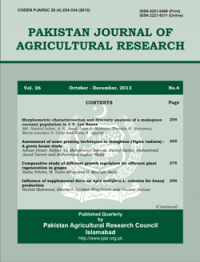Impact of Different Irrigation Regimes on Growth, Yield and Nodulation of Mung Bean
Impact of Different Irrigation Regimes on Growth, Yield and Nodulation of Mung Bean
Muhammad Mansoor1, Shahid Hameed Khalil2,4*, Muhammad Arshad Khan3, Ghani Akbar2, Muhammad Shahzad Khan4, Rana Naveed Mustafa2 and Salah ud Din5
ABSTRACT
A field study at the Arid Zone Research Center in D.I Khan, Pakistan, assessed the impact of varied irrigation methods on mung bean growth, yield, and nodulation. Results showed superior performance in raised beds compared to flatbed systems, indicating their positive influence on mung bean outcomes. The study highlighted that a three-day irrigation schedule positively affected growth and nodulation, while a six-day interval was optimal for maximizing seed yield. Balancing vegetative growth and seed yield is crucial for overall productivity in arid regions of Pakistan. This study underscores the importance of adopting appropriate irrigation schedules for mung beans in such environments.
To share on other social networks, click on any share button. What are these?






